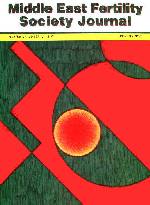
|
Middle East Fertility Society Journal
Middle East Fertility Society
ISSN: 1110-5690
Vol. 9, Num. 1, 2004, pp. 89-89
|
Middle East Fertility Society Journal, Vol. 9, No. 1, 2004, pp. 89
LETTERS-TO-THE-EDITOR
Prevention of ovarian
hyperstimulation syndrome.
Code Number: mf04015
Sir,
I mentioned in the
Evidence-based corner of the MEFSJ under the title of “Prevention of ovarian
hyperstimulation syndrome” modified
summaries of all reviews included in the electronic data of the Cochrane
library dealing with the prevention of OHSS (1). These included; Coasting (withholding gonadotrophins) for preventing
ovarian hyperstimulation syndrome, intravenous albumin for preventing severe
ovarian hyperstimulation syndrome and embryo freezing for preventing ovarian
hyperstimulation syndrome.
The Cochrane review of five
randomized controlled trials of albumin infusion versus placebo/no treatment
for women at high risk of developing severe OHSS after COH demonstrated
significant reduction in severe ovarian hyperstimulation syndrome on
administration of human albumin (2).
I
would like to quote a summary of a large prospective randomized controlled
trial that was reported by Bellver et. al. in November, 2003 in which they
compared albumin infusion with no treatment in patients at high risk of
moderate to severe OHSS after COH, in order to ascertain the actual preventive
role of intravenous albumin (3).
At
the Instituto Valenciano de Infertilidad (Valencia, Spain) women undergoing IVF with >20 retrieved oocytes
were included. A total of 988 patients was initially enrolled.
Immediately after oocyte retrieval, patients were
allocated to two groups based on a computer randomization: the first group
received 40 g human albumin; the second group received no treatment. Subjects
were weighed and a blood analysis performed immediately after oocyte retrieval
and again 7 days later. Women were monitored on an outpatient basis until
menstruation, or until fetal heart activity was detected. Twelve subjects were
excluded due to follow-up loss, leaving 976 women (377 of them oocyte donors),
with 488 in each group.
This
study showed no difference between the two groups in terms of patient
characteristics and outcome. Moderate-severe and severe only OHSS rates were
similar. The incidence of haemoconcentration and liver and renal dysfunction
at 7 days after oocyte retrieval was similar in the two groups. In women who
developed moderate/severe (n = 66) or only severe (n = 46) OHSS, there was no
difference based on prior albumin administration between blood parameters or
body weight on the day of oocyte retrieval, 7 days later, and even when
comparing variation between both measurements.
Moreover,
the number of patients with paracentesis, hospital admissions, complications
and days of OHSS until resolution did not differ.
Bellver
et. al. concluded that intravenous albumin infusion on the day of oocyte
retrieval is not a useful means of preventing the development of
moderate-severe OHSS.
References
- Elhelw B. Prevention of ovarian hyperstimulation syndrome:
Evidence-based medicine corner. Middle East
Fertil Soc J 2003; 8:3; 276-8.
- Aboulghar M, Evers JH, Al-Inany H.
Intra-venous albumin for preventing severe ovarian hyperstimulation syndrome
(Cochrane Methodology Review). In: The Cochrane Library, Issue 4, 2003. Chichester, UK: John Wiley
& Sons, Ltd.
- Bellver J,
Munoz EA, Ballesteros A, Soares SR, Bosch E, Simon C, Pellicer A and Remohi J.
Intravenous albumin does not prevent moderate-severe ovarian hyperstimulation
syndrome in high-risk IVF patients: a randomized controlled study. Hum Reprod.
2003 Nov; 18(11):2283-8.
Bassam Elhelw,
MRCOG, MFFP
Consultant in Obstetrics and Gynecology,
Middle East Fertility
Center,
Cairo, Egypt.
Copyright © Middle East Fertility Society
|
